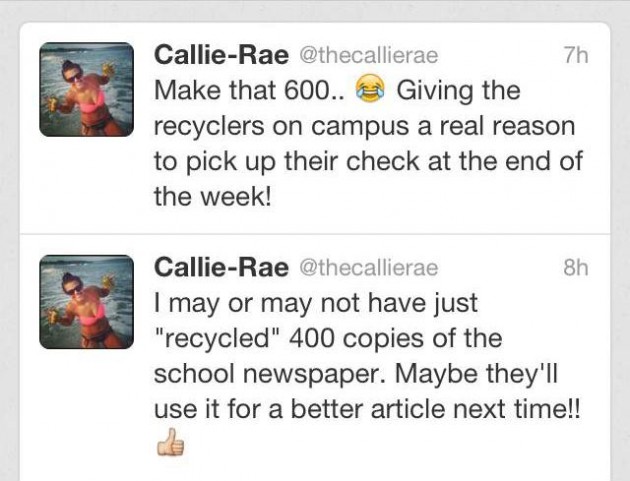Two wrongs don’t make a right

On Sept. 18 The Spartan hit the racks for the first time of the semester. Early that morning, roughly 1,500 papers were distributed around campus.
By the time students headed out for class, several hundred of those papers had been taken from racks and thrown away.
Castleton student Callie-Rae Cashin shared on her Twitter feed later that morning that she had first “recycled” 400 newspapers and updated that number to 600 later in the day.
The Spartan Co-Editors, Martina Marchese and Molly DeMellier, at first thought the lack of papers was a good sign, but quickly discovered the truth; the papers had been discarded in reaction to the front-page story written about the thefts from Dick’s Sporting Goods involving six Castleton athletes.
“It was so frustrating and upsetting,” said Marchese. “It was one of our best issues, with so many other great stories, and it went to waste.”
DeMellier agreed.
“So much goes into every issue we put out,” DeMellier said.
Since the incident, both editors agree there have been fewer students willing to contribute their work to The Spartan.
“Nothing beats seeing your name in a byline. It never gets old. I was sorry for our staff who had that opportunity thrown in the trash,” DeMellier said.
The pair addressed the issue with Cashin, who agreed to meet with them to navigate the next step. Marchese and DeMellier sought to have Cashin repay The Spartan $330 – the cost of printing the alleged 600 tossed papers.
Spartan advisor and communication professor Dave Blow was also at the meeting, and suggested an educational consequence, seeking to have Cashin read each article in that issue and write a summary about each.
“I wanted her to realize that she didn’t just throw away that one story, but several positive stories that students worked hard on,” said Blow, who added he was more interested in having Cashin learn something from her actions than pay money.
But that didn’t happen. Cashin, who declined to comment for the article, sent an email to The Spartan staff apologizing for her actions, but only taking responsibility for tossing 15 papers. She also said she didn’t know why she claimed to have thrown out 600 in her tweet. Cashin took the issue to the College Court and a hearing was held on Oct. 29.
Both Marchese and DeMellier attended the hearing, giving their sides of the event.
“We went into the room twice to tell our side and explain how we distribute the papers across campus,” said DeMellier. “Weeks passed and we never heard results.”
The College Court declined to comment due to strict confidentiality agreements.
When asked by a Spartan reporter about Cashin’s consequences Dean of Students Dennis Proulx followed suit with The College Court.
“Under the Federal Educational Rights and Privacy Act (FERPA) we are not allowed to comment or disclose the outcomes of discipline procedures,” he said.
Cases similar to this occur frequently on college and high school campuses around the country, according to officials at the Student Press Law Center.
SPLC is the nation’s only legal assistance agency solely dedicated to helping both high school and college journalists navigate the choppy waters of the First Amendment and the responsibilities that accompany it.
Attorney Advocate Adam Goldstein works for SPLC and is always on the hunt to assist on a legal case involving campus media.
“The college court system is flawed,” Goldstein said. “It’s a joke disguised as something useful. Its main purpose is to allow students to get away with things that they wouldn’t get away with in the real legal system.”
Goldstein explained that the case against Cashin is solid; the destruction of at least 400 newspapers with financial damages reaching $330 would qualify as petit larceny and theft.
“This case could be taken to the cops immediately,” Goldstein added. “If someone destroyed 400 copies of the Wall Street Journal, they’d be arrested on the spot. This is no different.”
Contacting police is an option, but so far it’s not one Spartan leaders are attempting to pursue.
“I’m not interested in doing that, but I am disappointed at the resolution,” Blow said. “I guess I don’t like the censorship message it sends as far as tossing away papers.”
Marchese and DeMellier agree.
“We work really hard to make this paper happen and it’s disappointing that someone wouldn’t take that into consideration before deciding to go through with something like that,” said Marchese.







